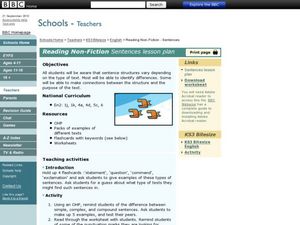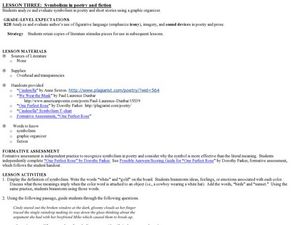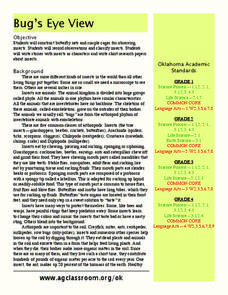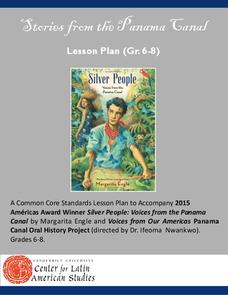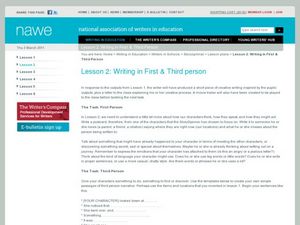Curated OER
Facts, Fictions and Perceptions of Regions
Students examine the different characteristics of the regions of the United States. They discuss places they have visited in the U.S., and in small groups conduct research on a selected region of the U.S. Each group labels a map of...
Curated OER
Exploring the West Using Fiction
Young scholars explore post Civil War development of the American West. They investigate the conflict among various groups involved in the settlement of the West and select a novel by a western writer and complete questions from the...
Curated OER
Catching on to Catcher in the Rye
Students conduct Internet research to analyze Holden Caulfield from the novel, the Catcher in the Rye. Once they have researched various sites to gain insight into Caulfield's problems, they write letters from one character to another. ...
Curated OER
Reading Non-Fiction Sentences
Students identify differences in types of sentences. In this sentence structure lesson, students discuss the different ways sentences are written according to their intended audience. Students create different types sentences...
Curated OER
Pet Overpoulation: Fact or Fiction
Students examine the benefits of spaying and neutering animals. In this animal welfare lesson, students define the terms "spaying" and "neutering." Students listen to a lecture about the benefits of spaying and neutering and complete a...
Curated OER
Writing a Fantasy Story - Time Travel
Middle schoolers write a fantasy story about time traveling back to the time of the Oregon Trail. For this Oregon trail lesson students gather information from their Social Studies textbook about life during the time of the Oregon Trail.
Curated OER
Sound Devices in Poetry, Fiction and Nonfiction
Learners examine the impact of sound devices in poetry. In this poetry lesson, students read the listed poems and identify uses of alliteration, repetition, consonance, rhythm, rhyme, and slang. Learners discuss how sound devices enhance...
Curated OER
Symbolism in Poetry and Fiction
Students examine the use of symbolism in literature. In this literary elements lesson, students discuss the attributes of symbolism. Students then read selected Cinderella stories and "The Fall of the House of Usher," and identify the...
Curated OER
Listen to Poems and Rhyme
Learners create rhymes. In this rhyming lesson students supply rhymes for Bringing the Rain to Kapiti Plain. The learners group words according to rhyming patterns.
Curated OER
Causes
What makes someone cry? Little learners read the story, Why Do You Cry?: Not a Sob Story by Kate Klise to discover a bit about crying and a bit about cause and effect. They'll fill out a cause and effect chart while they...
Curated OER
Using Chapter Titles to Determine the Main Idea
Second graders listen to the passage titled Pumpkin Picking and identify the main idea based on the title. In this main idea lesson plan, 2nd graders discuss how the title of a book or chapter sets the tone for the reading.
Curated OER
Creating a Chapter Title
Second graders identify the main idea of a selection of text. For this creating a chapter title lesson, 2nd graders discuss how to find the main idea of a chapter, listen to a chapter read aloud, and create a title with explanation.
Curated OER
Bug's Eye View
Students explore biology by writing fictitious stories in class. In this insect life lesson, students identify many different types of insects in the animal kingdom and the classifications they fall into. Students collect insects on a...
Curated OER
Paul Revere's Ride-Fact or Fiction?
Students discuss Paul Revere's ride. In this social studies lesson, students read Paul Revere's Ride and compare the differences between the poem and the historical event.
Digital Writing and Research Lab's – Lesson Plans
Teaching Close Reading through Short Composition/Revision
This activity may have writers evaluate short compositions, but their subjects are quite tall: great Americans. Pupils read one another's compositions and closely examine how specific phrases and diction contribute to shaping American...
Vanderbilt University
Stories from the Panama Canal
The stories of the Silver People, the West Indies immigrants hired to work on the Panama Canal, come to life in a lesson about the building of the Panama Canal. Groups research why the canal was built, how it was build, the working...
EngageNY
Building Background Knowledge: Learning About the Historical and Geographical Setting of Esperanza Rising (Chapter 1: “Aguascalientes, Mexico, 1924”)
Set up your class to read Esperanza Rising, by Pam Muñoz Ryan, through a class read-aloud and exploration of the setting. The detailed instructional activity outlines each step. First, class members read over the first few pages and...
Curated OER
Writing in First and Third Person
Explore narrative writing by participating in a role-playing activity. In this perspective lesson, learners define first and third person in writing and discuss how it changes the mood of the reader. The first activity has pupils write...
Curated OER
Text Clues and Prior Knowledge
Explore making predictions as a reading strategy. As a class, read "Blue Light, Green Light," stopping to make a prediction. After recording a prediction on the graphic organizer, discuss the thoughts behind your idea. Then, continue...
Curated OER
Antagonist
Young learners explore the antagonist. They retell Hansel and Gretel and identify the witch and the stepmother as antagonists. They then brainstorm common character traits of an antagonist, and then write a paragraph describing...
Curated OER
Thinking About Theme
Writers use the literary element of conflict to develop their theme. Use the conflict between the Johnny and the ScreeWees in Terry Pratchett’s Only You Can Save Mankind to model how a major theme is revealed. The conflict between the...
Curated OER
Writing Short Stories: The Fun Way
Do your young authors suffer from writer's block when they try to write short stories? Access their natural creativity with C-Gor, the writing monster! The instructional activity takes aspiring authors through a new writing process...
Curated OER
Mississippi Trial, 1955: A Request Strategy for Questioning
Knowledge, comprehension, application, analysis, synthesis, evaluation. Class members use Bloom's taxonomy to craft six levels of discussion questions for Chris Crowe's novel, Mississippi Trial, 1955. Model questions from Chapter 3, a...
Curated OER
Reacting to Literature
Students summarize a book which they have read. A slide show depicting an action scene in their chosen book is created and three main characters described using a web.
Other popular searches
- Non Fiction
- Historical Fiction
- Science Fiction
- Non Fiction Text Features
- Realistic Fiction
- Fiction and Nonfiction
- Elements of Fiction
- Fiction or Nonfiction
- Non Fiction
- Fictional Narrative
- Non Fiction Writing
- Teaching Historical Fiction



